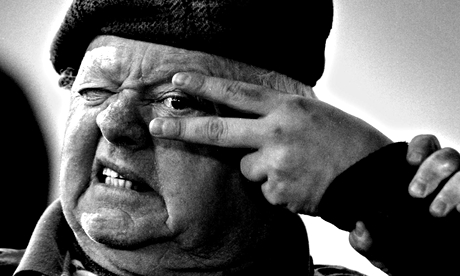
Sugar Babies at the Savoy is an exercise in unabashed nostalgia. Although it is a tribute to American burlesque I found myself wafted back to the Hippodromes and variety palaces of my youth where the comics were low, the chorus girls high, and meanings invariably double. To a theatre paralysed with good taste it brings the reverberating rudeness of a whoopee-cushion.
In fact, I suspect authentic American burlesque was much rougher and tackier than Sugar Babies suggests. Edmund Wilson in 1925 described a visit to the Minsky Brothers Follies of which the highlight was an Antony and Cleopatra sketch. Caesar entered on a bicycle blowing his own bugle. The dying Cleopatra (the principal striptease girl) cried "Bring me the wassup" at which point her slaves presented her with a huge prop phallus. And, as she fell prone over her lover's body, Caesar placed on her posterior a wreath which he proceeded to tend with a watering can.
Only one sketch in Sugar Babies comes close to that antic anarchy and that is a court-room scene with Mickey Rooney as an uncontrollably priapic judge and Ann Miller as a leg-flashing murderess. The mere sight of her has Mr Rooney getting his leg over the judicial stand and at one point he feels obliged to inspect the accused's pins. "You're scrutinising the defendant?" he is asked. "Not yet," he replies, "but I could get lucky."
After Ms Miller has made much play with the way her late husband whipped out his gun, Mr Rooney is asked if he is going to give her a stiff sentence. "If I get a good night's sleep," he retorts, "I might give her a whole paragraph."
Vulgar? Of course. Sexist? Probably. But the sketch is very funny precisely because it makes a bonfire of the whole notion of judicial impartiality. It also reminds me of Edmund Wilson's point that the great thing about burlesque was that it had "nothing of the peculiar smartness and hardness one is accustomed to elsewhere in New York."
We have lately seen an example of that in the reverent attempt to revive the world of Ziegfeld Follies. Compared with that Sugar Babies is a refreshingly bawdy celebration of the unquenchable sexual urge. At one point a geriatric groom with a young bride is asked if a honeymoon like that might not prove fatal. "Well," he shrugs, "if she dies, she dies."
But the charm of the show, conceived by Ralph Allen and Harry Rigby, rests very heavily on the durable appeal of Mickey Rooney and Ann Miller. Mr Rooney, bald, rotund and with a tongue that shoots out like a lizard's, suggests the Crazy Gang's Charlie Naughton cast as Pere Ubu; he is both baby-faced and dangerous at the same time. Ann Miller is the perfect foil in that she brings to everything she does a ladylike style and dignity; and when she reveals those famous legs and launches into a tap routine the years seem to fall away and we are back into the MGM musicals of 40 years ago.
My main cavil about Sugar Babies is that the references have now been Anglicised; jokes about Cleethorpes and Birmingham sit oddly in the hymn to American burlesque. I also regret the attempt to give the form respectability. "Don't listen to the snobs who say burlesque was mean and low," Mickey Rooney sings at the outset. But the joy of burlesque is that it was mean and low. The tackier Sugar Babies is the more l like it. At its best it is a reminder that ribald, risqué comedy is as much a part of our theatrical inheritance as Ibsen and Chekhov.

